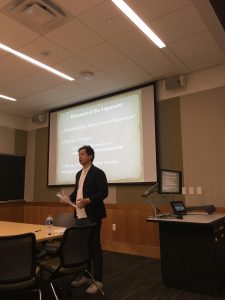by Alex Diamond
On Friday, April 20th, Boston University Sociology Professor Julian Go visited UT Austin for a public lecture on “The Origins of Police Militarization in the United States” and a workshop with graduate students. The event was co-sponsored by the Urban Ethnography Lab as well as the Power, History, and Society (PHS), Crime, Law, and Deviance (CLD), and Race and Ethnicity (R&E) working groups. Dr. Go’s discussion with graduate students focused on three strands that came out of students’ questions: how to frame research questions and projects, how to combine historical comparative work and ethnography, and finally his work on post-colonial theory.

In a meeting with sociology graduate students who do research in sites as diverse as Peru, Colombia, Brazil, Tunisia, Lebanon, India, and Nepal, Dr. Go offered advice on how to sell projects to a discipline that is often parochial. He suggested students frame their work in terms of how specific sites can help us understand the United States or give insight into broader theoretical mechanisms. In more general terms, Dr. Go pushed students to avoid developing research projects such that they already know what they are going to find. He advised: “Make sure to design the project in a way that it’s set up for surprises, and you can manage the surprise.” The most interesting findings, according to Dr. Go, come from these surprises, and research projects should be set up to capture multiple possibilities.
Students also asked more specific questions about doing historical comparative work and ethnography. Dr. Go said that he saw archival research as a kind of historical ethnography, using newspapers, diaries, and other sources to reconstruct the universes of meaning of a different time and culture. He drew a similar parallel to ethnography in terms of how to enter a site. He suggested that like ethnography, archival research should begin with a critical entry way or person, and then use a kind of snowball sampling to see where that entry point leads you. He also advocated for the integration of historical work into ethnographic research, something he said is currently lacking in the field. Doing this successfully, he argued, requires making sure the historicization operates from concepts that are relevant to the contemporary site, maintaining an analytic continuity between past and present. “Think about the best ethnographies and best historical work,” he said, “and think about what it would mean to put them together.”
Finally, Dr. Go spoke about his own work on post-colonial theory. He said that this epistemological challenge arose because sociology as a discipline has been tethered to the interests of empire. In this account, early sociology became interested in race and social order precisely because they were interested in what natives were doing in colonies. Though sociologists disavow this early racist work, some of the same analytic tendencies persist, including a bifurcation that separates “us” from “them,” “here” from “there,” and the metropole from the colony. Dr. Go argued that sociologists lose a lot with this approach.
Dr. Go’s lecture later in the day provided an excellent example of how a post-colonial perspective allows for analytical richness. He showed how ongoing processes of police militarization in the United States cannot be understood without looking at their roots in techniques used under American imperialism to police their colonies. As such, he suggested we should re-theorize police militarization as “colonial counter-insurgenization,” allowing for an understanding of how techniques of control developed in colonies were transferred to domestic urban spaces and organized around the same racialized logic. Both the lecture and Dr. Go’s workshop were thought-provoking and inspiring for attendees.
Alex Diamond is a first-year student in the Sociology Department. His research interests center on the construction of citizenship in the post-conflict transition in areas of rural Colombia that were previously under insurgent control.
